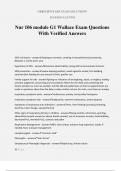©BRIGHTSTARS EXAM SOLUTIONS
11/14/2024 12:19 PM
Nur 106 module G1 Wallace Exam Questions
With Verified Answers
SIDS risk factors - answer✔sleeping on stomach, smoking in household and prematurity,
Between 1 month and 1 year
Hypothesis of SIDs - answer✔Brainstem abnormalities, along with environmental stressors
SIDS prevention - answer✔supine sleeping position, avoid cigarette smoke, firm bedding,
exclusive Bret feeding for any amount of time, pacifier use
Family support for sids - answer✔giving no indication of wrongdoing, abuse, or neglect; making
sensitive judgments concerning any resuscitation efforts for the child; and comforting the
family members as much as possible. Call the OB and pediatrician so that no appointments are
made or questions about how the baby is when mother returns for visits, must have an autopsy
respiratory symptoms early - answer✔restlessness, anxiety, tachycardia/ tachypnea
respiratory symptoms late - answer✔bradycardia, extreme restlessness, severe dyspnea
Symptoms of respiratory tract infections - answer✔Fever, Poor feeding (anorexia),Vomiting,
Diarrhea, Color change, sweaty/clammy
Other signs of respiratory distress in children - answer✔flaring nostrils, retractions, grunting,
adventitious breath sounds (or absent breath sounds), use of accessory muscles, head bobbing ,
decreased Po2, elevated Pco2, cyanosis and pallor
Respiratory Management - answer✔H&H, clear airway, enhance lung expansion, isolate if
needed, fever and pain management
nasopharyngitis - answer✔"Common cold"
Pharyngitis - answer✔"Soar throat"
Streptococcal Pharyngitis diagnostic - answer✔Rapid strep, throat culture
1|Page
, ©BRIGHTSTARS EXAM SOLUTIONS
11/14/2024 12:19 PM
Streptococcal Pharyngitis therapeutic management - answer✔Full course antibiotic ,check urine
for protein in 2 weeks
Tonsillectomy/adeniodectomy - answer✔Avoid citrus, ice cream, red liquids, dairy products
Acute Laryngotracheobronchitis - answer✔Affects children less than 5 yrs
Usually viral
Stridor
Cool mist (tent or hood), nebulized epinephrine, corticosteroids
Assessment extremely important
Fluids, rest, reduce agitation
Acute Laryngotracheobronchitis causes - answer✔- Caused by RSV, influenza A&B, M.
pneumoniae
- Sx: Low-grade fever, restlessness, hoarseness, barky cough, inspiratory stridor, retractions
Acute Epiglottitis - answer✔Inflammation of the epiglottis; H influenzae type b is the most
common cause, especially in nonimmunized children, Causes airway obstruction
Acute Epiglottitis therapeutic - answer✔Assess airway, manage airway, anti-infammitories,
maintain child in upright position
Bronchiolitis (RSV) - answer✔viral infection the bronchioles that is characterized by thick
secretions
RSV - answer✔contact isolation, monitor pulse ox/CR, maintain airway
Prevention of RSV - answer✔Palivizumab (Synagis) monoclonal antibody, which is given
monthly in an IM injection for a maximum of five doses to prevent hospitalization
pneumonia - answer✔An inflammation of lung tissue, wherer the alveoli in the affected areas
fill w/fluid
Pneumonia treatment - answer✔Rest, antibiotic administration for bacterial strain, position
changes
Foreign body aspiration problems - answer✔Asphyxiation, respiratory tract infection
Foreign body aspiration - answer✔Leading cause of fatal injury in children younger than 1 year,
most common in children 1-3 years
2|Page
, ©BRIGHTSTARS EXAM SOLUTIONS
11/14/2024 12:19 PM
Common foreign body aspirates - answer✔Fun foods, sharp objects, balloons
Asthma - answer✔chronic inflammatory disorder of the airways characterized by recurring
symptoms, airway obstruction, bronchial hyperresponsiveness, and an underlying inflammation
process
Clinical manifestation of asthma - answer✔Shortness of breath, Prolonged expiratory phase,
Audible wheeze, May have a malar flush and red ears, Lips deep, dark red color, May progress
to cyanosis of nail beds or circumoral cyanosis, Restlessness, Apprehension, Prominent
sweating as the attack progresses Older children sitting upright with shoulders in a hunched-
over position, hands on the bed or chair, and arms braced (tripod) Speaking with short, panting,
broken phrases
Goals of Asthma Management - answer✔Avoid exacerbation
Avoid allergens
Relieve asthmatic episodes promptly
Relieve bronchospasm
Monitor function with peak flow meter
Self-management of inhalers, devices, and activity regulation
Non parm interventions of asthma - answer✔ID and control triggers
Asthma Long term "control" (anti-inflammatory) drugs - answer✔Cromolyn, nedocromil
Asthma Short term "rescue" (bronchodilator) drugs - answer✔Albuterol, Xopenex
status asthmaticus - answer✔is a medical emergency that can result in respiratory failure and
death if untreated. Children who continue to display respiratory distress despite vigorous
therapeutic measures, especially the use of sympathomimetics (e.g., albuterol, epinephrine),
are in status asthmaticus. The condition may develop gradually or rapidly, often coincident with
complicating conditions, such as pneumonia or a respiratory virus, that can influence the
duration and treatment of the exacerbation
Status asthmaticus treatment - answer✔Epinephrine, B2 agonis, determine cause, Humidified
oxygen is recommended and should be given to maintain SaO2 greater than 90%
Etiology of cystic fibrosis - answer✔Genetic transmitted by an autosomal recessive trait, most
common lethal GENETIC illness among Caucasian children
Organ systems affected by CF - answer✔Respiratory, GI, and pancreatic ducts
3|Page




